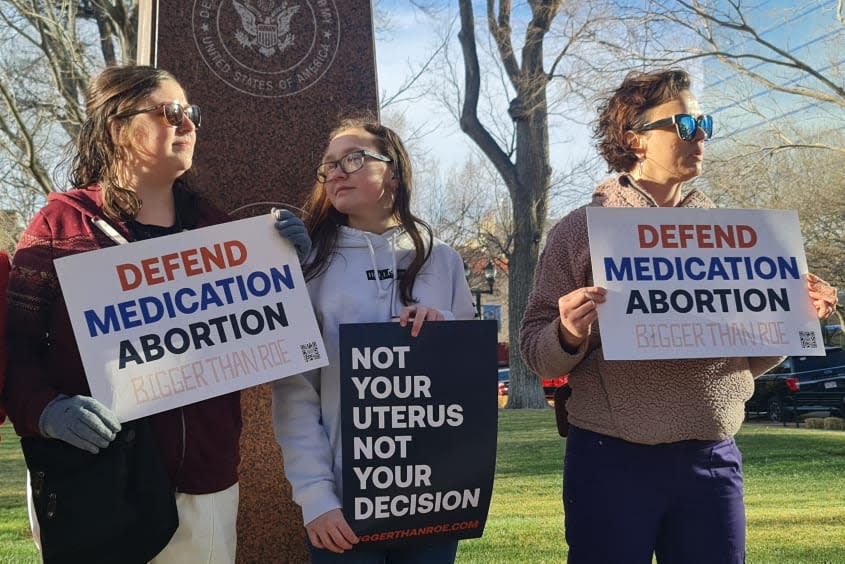What makes Idaho's 'abortion trafficking' bill a next-level restriction

This week, the Idaho state Senate read for the first time a draft of House Bill 242, a new Republican-led push to further limit abortion access in a state with some of the most restrictive reproductive health laws already on the books. The measure, dubbed the "abortion trafficking" bill, has been hailed by proponents as a major step forward for parental rights, while detractors worry it sets a new precedent for red states in the country's post-Dobbs era.
So what would the bill actually do, where does it stand now, and does it really have a chance at becoming law?
What is 'abortion trafficking'?
According to the text of the bill:
An adult who, with the intent to conceal an abortion from the parents or guardian of a pregnant, unemancipated minor, either procures an abortion [...] or obtains an abortion-inducing drug for the pregnant minor to use for an abortion by recruiting, harboring, or transporting the pregnant minor within this state commits the crime of abortion trafficking.
In this, the word "trafficking" is somewhat misleading; the bill does not overtly criminalize crossing state lines, which is a constitutional right. Rather, it makes it illegal to transport and aid a minor within Idaho hoping to access reproductive healthcare — either in-state, or through out-of-state assistance — without their parent's consent. Crucially, this includes helping a minor access pregnancy-ending drugs, such as mifepristone and misoprostol. Adults convicted under the proposed law could face anywhere from two to five years in prison.
"Since the bill would criminalize anyone transporting a pregnant minor without parental consent within the state to get an abortion or to obtain medication abortion," writes HuffPost, "it could apply to an aunt who drives a pregnant minor to the post office to pick up a package that includes abortion pills."
The bill also allows family members to sue reproductive health professionals for a minimum of $20,000 for having "knowingly or recklessly attempted, performed, or induced an abortion" in violation of the statute.
What are advocates saying?
"We want to make sure that parents have a say in the life choices of their children," Republican State Rep. Kevin Andrus, one of the bill's co-sponsors, told The Associated Press. "It will do a lot to save lives."
Speaking with HuffPost, fellow co-sponsor Rep Barbara Ehardt agreed, explaining that "it's already illegal to get an abortion here in the state of Idaho. So, it would be taking that child across the border, and if that happens without the permission of the parent, that's where we'll be able to hold accountable those that would subvert a parent's right."
Mistie DelliCarpini-Tolman, the Idaho State Director for Planned Parenthood Alliance Advocates, pushed back on that claim, telling local CBS affiliate KMVT that "the majority of young people facing an unexpected pregnancy do involve their parents in their decision-making. But, for young children living in abusive households, disclosing sexual activity or pregnancy can trigger physical or emotional abuse, including direct physical or sexual violence, or being thrown out of the home."
Idaho Senate Minority Leader Melissa Wintrow was even more direct in her criticism of the proposed legislation, telling HuffPost that "The far right has an incremental plan. It's death by a thousand cuts on many things, but they're especially unrelenting on abortion."
"My colleagues are just rabid about denying all access to abortion care," she added. "It's really harmful to women, and it's harmful to our state."
Will the bill actually pass?
As things currently stand, it seems extremely likely that HB242 will become law in the near future. Earlier this month the GOP-led state House overwhelmingly passed the measure 57-12, with just two Republicans crossing the aisle to oppose the bill. This week, it cleared the Republican-controlled state Senate, where Democrats are outnumbered 4-1. It now goes to the desk of Gov. Brad Little (R), who, when asked by ABC News for comment, declined to say whether he'd sign the measure. Just over one year ago Little, a staunch opponent of abortion, signed Idaho's Texas-modeled ban on abortions after six weeks of pregnancy.
"It feels terribly inevitable that this bill will pass," Minority Leader Wintrow told Huffpost. "That's what we're facing. That's my fear. That's the pit in my stomach."
You may also like
Millions of Americans poised to lose Medicaid coverage on April 1
Jennifer Aniston says Friends is now 'offensive' to a 'whole generation of people'
The Gwyneth Paltrow ski crash trial's 8 strangest moments, from Taylor Swift to King Kong

